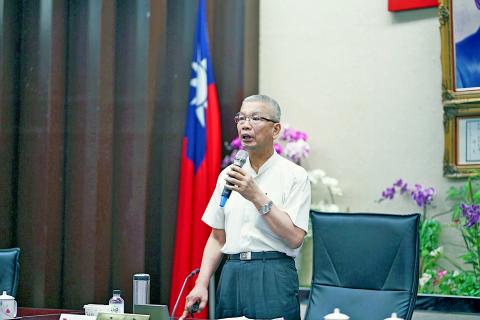The Ministry of Finance yesterday proposed raising corporate income tax rates and cutting personal income tax rates in a bid to make the nation’s tax burdens more equitably distributed without losing global competitiveness.
Minister of Finance Sheu Yu-jer (許虞哲) unveiled the reform package, which seeks to address concerns that the tax system disadvantages salaried people, small and medium-sized enterprises and skilled workers.
“We suggest increasing corporate income tax rates from 17 percent to 20 percent to support cuts on corporations’ retained earnings and higher tax deductions for middle and low-income earners,” Sheu told a news conference.

Photo: CNA
The package, which requires approval from the Cabinet and the Legislative Yuan, would benefit 5.42 million people if put into practice, which would be next year at the earliest, Sheu said, adding that the package would cost the government between NT$5.9 billion and NT$6.9 billion (US$195.6 million and US$228.8 million).
The business income tax is relatively low, so a mild increase should be harmless, Sheu said.
The measure would call for a 5 percent to 10 percent tax reduction on retained earnings, allowing companies more financial means to plan expansions and upgrades, Sheu added.
The change is important for small and medium-sized enterprises, as they tend to have more trouble raising funds than large-cap firms, he said.
The ministry also suggested lowering the personal income tax cap from 45 percent to 40 percent, on par with South Korea, but lower than China’s and Japan’s 45 percent.
China in particular has courted skilled technology engineers from Taiwan by offering exceptionally high salaries to help build its semiconductor industry, it said.
The ministry also called for a 1 percent increase in the dividend income tax for foreign investors from the current 20 percent.
The increase is intended to narrow the difference between foreign and local investors, who are subjected to personal income tax rates of up to 45 percent.
The large gap has encouraged tax evasion and fund outflows through the creation of foreign dummy firms, accounting companies have said.
The ministry detected a need for change in light of the free and convenient capital flows to global markets, which promise higher yields and lower costs, officials said.
The ministry also introduced a separate tax plan for dividend income under which Taiwanese investors could choose a flat 26 percent tax after a deduction of NT$80,000.
Alternatively, local investors could adopt a progressive scheme that would spare 37 percent of their income tax dividends and subject the remaining amount to personal income taxes of 5 percent to 40 percent, the proposal said.
The ministry would settle on a measure before turning it over to the legislature, which is to review the package later this month, Sheu said.

Right-wing political scientist Laura Fernandez on Sunday won Costa Rica’s presidential election by a landslide, after promising to crack down on rising violence linked to the cocaine trade. Fernandez’s nearest rival, economist Alvaro Ramos, conceded defeat as results showed the ruling party far exceeding the threshold of 40 percent needed to avoid a runoff. With 94 percent of polling stations counted, the political heir of outgoing Costa Rican President Rodrigo Chaves had captured 48.3 percent of the vote compared with Ramos’ 33.4 percent, the Supreme Electoral Tribunal said. As soon as the first results were announced, members of Fernandez’s Sovereign People’s Party

MORE RESPONSIBILITY: Draftees would be expected to fight alongside professional soldiers, likely requiring the transformation of some training brigades into combat units The armed forces are to start incorporating new conscripts into combined arms brigades this year to enhance combat readiness, the Executive Yuan’s latest policy report said. The new policy would affect Taiwanese men entering the military for their compulsory service, which was extended to one year under reforms by then-president Tsai Ing-wen (蔡英文) in 2022. The conscripts would be trained to operate machine guns, uncrewed aerial vehicles, anti-tank guided missile launchers and Stinger air defense systems, the report said, adding that the basic training would be lengthened to eight weeks. After basic training, conscripts would be sorted into infantry battalions that would take

EMERGING FIELDS: The Chinese president said that the two countries would explore cooperation in green technology, the digital economy and artificial intelligence Chinese President Xi Jinping (習近平) yesterday called for an “equal and orderly multipolar world” in the face of “unilateral bullying,” in an apparent jab at the US. Xi was speaking during talks in Beijing with Uruguayan President Yamandu Orsi, the first South American leader to visit China since US special forces captured then-Venezuelan president Nicolas Maduro last month — an operation that Beijing condemned as a violation of sovereignty. Orsi follows a slew of leaders to have visited China seeking to boost ties with the world’s second-largest economy to hedge against US President Donald Trump’s increasingly unpredictable administration. “The international situation is fraught

GROWING AMBITIONS: The scale and tempo of the operations show that the Strait has become the core theater for China to expand its security interests, the report said Chinese military aircraft incursions around Taiwan have surged nearly 15-fold over the past five years, according to a report released yesterday by the Democratic Progressive Party’s (DPP) Department of China Affairs. Sorties in the Taiwan Strait were previously irregular, totaling 380 in 2020, but have since evolved into routine operations, the report showed. “This demonstrates that the Taiwan Strait has become both the starting point and testing ground for Beijing’s expansionist ambitions,” it said. Driven by military expansionism, China is systematically pursuing actions aimed at altering the regional “status quo,” the department said, adding that Taiwan represents the most critical link in China’s